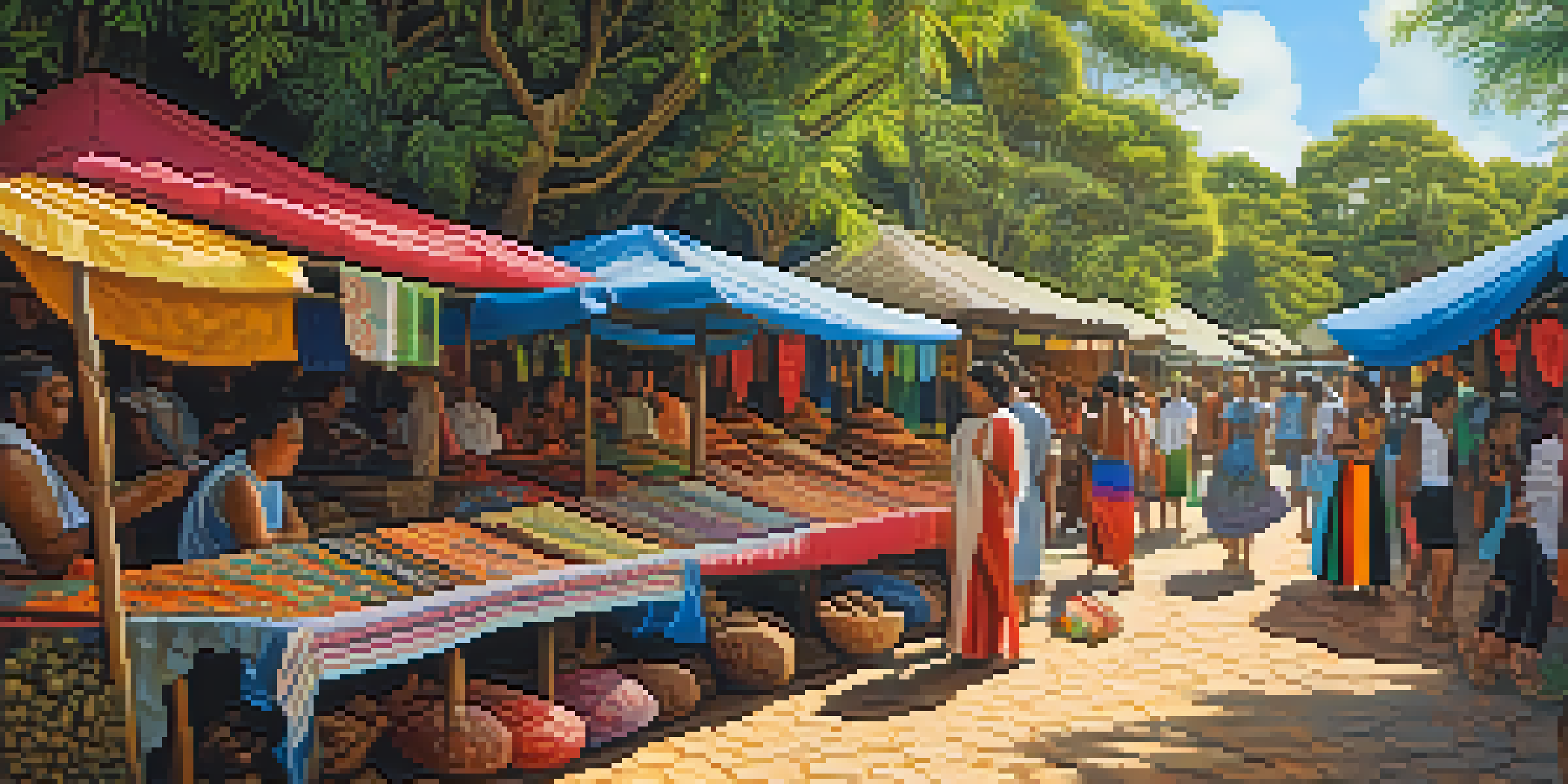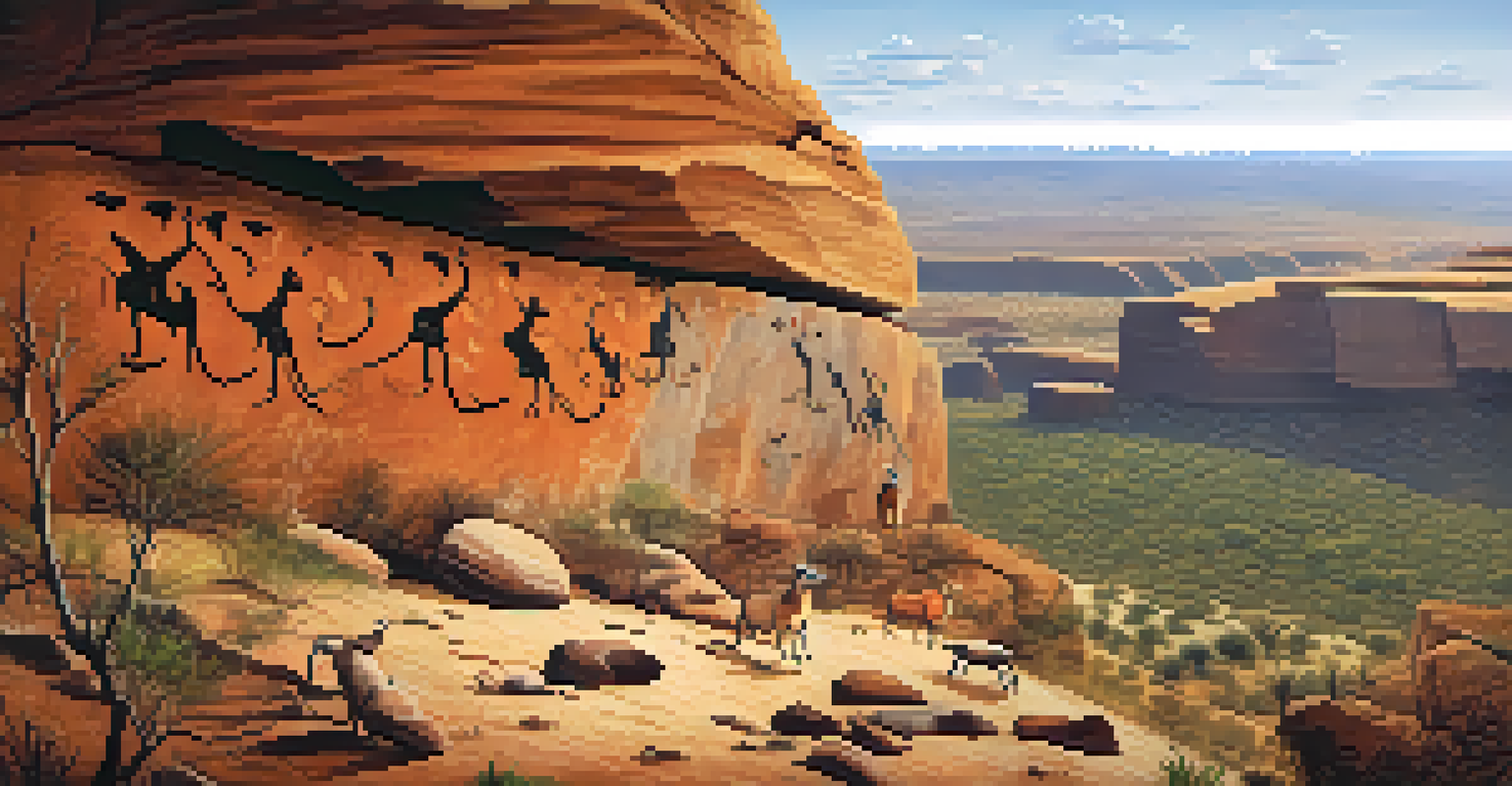Brazil's Indigenous Heritage: Exploring Key Historical Sites

Understanding Brazil's Indigenous Heritage and Its Importance
Brazil's Indigenous heritage is a vibrant tapestry woven through centuries of history, culture, and tradition. With over 300 distinct tribes, each with its own language and customs, the Indigenous peoples have significantly shaped Brazil's identity. Their connection to the land and natural resources reveals a sustainable way of life that continues to inspire conservation efforts today.
The earth does not belong to us; we belong to the earth.
The legacy of Indigenous communities is not just historical; it's alive in modern Brazil. From rituals and art to music and cuisine, their influence permeates various aspects of Brazilian culture. Acknowledging this heritage is crucial for understanding the nation’s past and present, fostering respect for these communities and their contributions.
Preserving Indigenous heritage also serves as a reminder of the challenges faced by these communities, including land rights and cultural preservation. By exploring historical sites, we not only honor their past but also support ongoing efforts for justice and recognition, ensuring their stories are told and remembered.
The Significance of Serra da Capivara National Park
Serra da Capivara National Park is a UNESCO World Heritage Site that offers a profound glimpse into the lives of prehistoric Indigenous peoples. Located in the state of Piauí, this park boasts thousands of rock paintings that date back over 25,000 years. These ancient artworks provide invaluable insights into the spiritual and daily lives of the Indigenous groups that once inhabited the region.

The vibrant colors and intricate designs found in the park's petroglyphs depict everything from hunting scenes to symbolic representations of animals. Visiting Serra da Capivara is like stepping back in time, where one can appreciate the creativity and resilience of these early inhabitants. The park not only preserves these artworks but also serves as a research hub for archaeologists and historians.
Rich Indigenous Heritage in Brazil
Brazil's Indigenous communities, with over 300 distinct tribes, have significantly shaped the nation's identity and continue to influence its culture today.
In addition to its archaeological significance, the park is a biodiversity hotspot, showcasing the rich flora and fauna of the region. By protecting this area, Brazil not only safeguards its Indigenous heritage but also promotes environmental conservation, creating a balance between cultural and ecological sustainability.
Exploring the Historic City of Salvador: A Cultural Hub
Salvador, the capital of Bahia, is a city where Indigenous heritage is palpably felt in its vibrant culture and history. This coastal city was one of the first colonial capitals and is known for its Afro-Brazilian culture, which has deep roots in Indigenous traditions. The blend of Indigenous, African, and European influences makes Salvador a melting pot of cultural expression.
Indigenous peoples are often the best stewards of the land, preserving biodiversity and cultural heritage.
Visitors to Salvador can explore historical sites such as Pelourinho, with its colorful colonial architecture and lively atmosphere. Here, you can witness traditional music and dance, including capoeira, which reflects the fusion of cultures. The local cuisine, rich with Indigenous ingredients like cassava and tropical fruits, offers a delicious taste of this heritage.
Salvador also holds significant places of worship, where Indigenous spiritual elements intertwine with African and Christian practices. This cultural amalgamation highlights the resilience of Indigenous traditions amidst colonial influences, making Salvador a living testament to Brazil's diverse heritage.
The Role of the Amazon Rainforest in Indigenous Culture
The Amazon Rainforest is not only a crucial ecological zone but also a sacred space for many Indigenous communities. Home to around 400 Indigenous groups, the rainforest is seen as a source of life, spirituality, and identity. For these communities, the forest is more than just land; it is a living entity that provides sustenance and holds ancestral significance.
Indigenous peoples of the Amazon have developed an intricate understanding of the ecosystem, practicing sustainable methods of agriculture, fishing, and hunting. This deep connection to the land fosters a unique relationship with nature, emphasizing the importance of biodiversity and conservation. Their traditional knowledge is invaluable in addressing contemporary environmental challenges.
Challenges Facing Indigenous Peoples
Indigenous communities in Brazil face critical challenges such as land rights, deforestation, and cultural assimilation, threatening their way of life.
However, the Amazon faces severe threats from deforestation and exploitation, putting Indigenous ways of life at risk. Advocating for the rights of these communities is essential in the fight to protect not only their culture but also the vital ecosystem they steward. The Amazon thus stands as a symbol of both heritage and resilience, underscoring the need for global awareness and action.
Visiting the Historic Site of São Miguel das Missões
São Miguel das Missões, located in southern Brazil, is a remarkable historical site that showcases the Jesuit missions established in the 17th century. This site is emblematic of the interactions between Indigenous peoples and European colonizers, leading to a unique cultural exchange. The ruins of the church and surrounding settlements stand as a testament to the efforts made to protect Indigenous communities while introducing Christianity.
The architecture of the site is stunning, with intricate carvings and stonework reflecting the blend of Indigenous and European styles. Visitors can explore the remnants of the mission, gaining insights into the lives of the Guarani people and their experiences during this period. The site is not just a relic of the past; it serves as a reminder of the complexities of cultural interaction.
As a UNESCO World Heritage Site, São Miguel das Missões plays a vital role in educating visitors about the Indigenous heritage of Brazil and the impact of colonization. By visiting, guests contribute to the preservation of this history and support ongoing efforts to honor the legacy of the Guarani and other Indigenous peoples involved in these missions.
The Cultural Significance of Indigenous Art and Crafts
Indigenous art and crafts are powerful expressions of culture, identity, and history. From intricate beadwork to vibrant textiles, these handmade creations tell stories that connect people to their heritage. Each piece often carries deep spiritual meaning, reflecting the beliefs and traditions of the respective tribes.
Visiting local craft markets and galleries can provide a firsthand look at the incredible skills of Indigenous artisans. These art forms not only serve as a means of income for many communities but also play a crucial role in preserving language and storytelling traditions. The sale of Indigenous art helps raise awareness and appreciation for their cultural narratives.
Cultural Preservation through Tourism
Responsible tourism and education can empower Indigenous communities by promoting their heritage and providing economic opportunities while fostering respect.
Supporting Indigenous artists promotes cultural continuity and empowers communities to share their stories with the world. By purchasing authentic art, visitors can take home a piece of Brazil's rich heritage while contributing to the sustainability of Indigenous cultures.
Challenges Facing Indigenous Communities Today
Despite their rich heritage, Indigenous communities in Brazil face numerous challenges in modern society. Issues such as land rights, deforestation, and cultural assimilation threaten their existence and way of life. Many Indigenous people continue to fight for recognition and respect, advocating for their rights amidst ongoing struggles against exploitation.
The loss of ancestral lands impacts not only their livelihoods but also their cultural practices and identity. As the rainforest diminishes, so does the wealth of traditional knowledge that has been passed down through generations. This loss poses a significant threat to biodiversity and the environment, as Indigenous peoples are often the best stewards of the land.

However, resilience shines through as many communities engage in activism and awareness campaigns to protect their rights and heritage. Collaborations with NGOs, environmental organizations, and allies worldwide amplify their voices, fostering a greater understanding of the importance of preserving Indigenous cultures for future generations.
Celebrating Indigenous Heritage through Education and Tourism
Education and responsible tourism play vital roles in celebrating and preserving Indigenous heritage. By learning about Indigenous cultures, visitors can gain a deeper appreciation for their history and contributions to society. Educational initiatives that promote Indigenous perspectives help dismantle stereotypes and foster respect for their ways of life.
Tourism, when done responsibly, can provide economic opportunities for Indigenous communities while promoting cultural preservation. Engaging with Indigenous-led tours allows visitors to experience their traditions authentically, from guided rainforest excursions to traditional cooking classes. This not only supports the local economy but also empowers Indigenous peoples to share their stories on their terms.
As awareness grows, there is potential for greater collaboration between Indigenous communities and the tourism industry, ensuring mutual benefits and respect. By prioritizing education and responsible practices, we can celebrate Brazil's Indigenous heritage while supporting the ongoing fight for cultural preservation and rights.